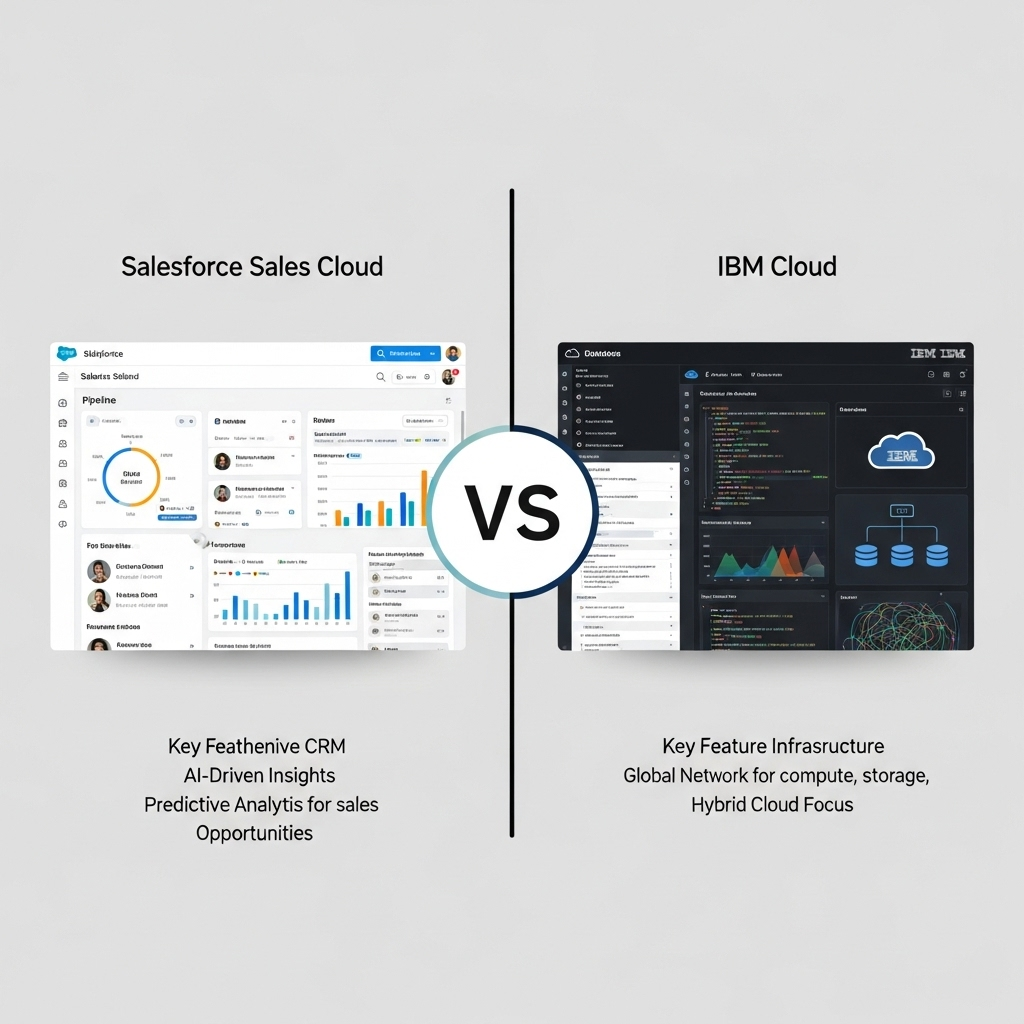Cloud service providers: Salesforce Sales Cloud vs. IBM Cloud
Quick Verdict
Salesforce Sales Cloud is best for organizations needing a dedicated CRM with strong sales-focused features, while IBM Cloud is suitable for those seeking a comprehensive cloud platform with diverse services and CRM capabilities.
- Salesforce Sales Cloud is a dedicated CRM solution with strong AI capabilities.
- IBM Cloud offers a broader range of cloud services, including CRM options and AI tools.
- Both platforms provide robust scalability, customization, and integration options.

Key features – Side-by-Side
| Attribute | Salesforce Sales Cloud | IBM Cloud |
|---|---|---|
| CRM Functionality | Comprehensive CRM solution designed to streamline sales processes, enhance productivity, and improve customer relationships. Includes lead, opportunity, and contact management, sales forecasting, and Salesforce automation. | IBM offers various marketing cloud software options, including IBM Marketing Cloud, IBM Leads, and IBM Watson Marketing. CRM.COM on IBM Cloud provides subscription billing, rewards, and digital money solutions. |
| Cloud Infrastructure Services | Cloud-based CRM (SaaS). Eliminates the need for on-premise infrastructure. Salesforce Hyperforce enables scaling via public cloud platforms. | IBM Cloud provides IaaS, PaaS, and SaaS. IaaS offerings include virtual servers, storage, and networking. |
| Scalability | Cloud-based infrastructure offers scalable infrastructure. Hyperforce allows global deployment and resource scaling. | IBM Cloud allows you to scale resources on demand in over 60 data centers. It offers both vertical and horizontal scaling. IBM Cloud PowerVS is designed for scaling IBM Power workloads. |
| Customization Options | Customizable to meet specific business requirements. Options for functionality, integrations, and user interface. Includes custom objects, fields, reports, dashboards, formulas, and code-level modifications. | IBM Cloud's VPC infrastructure is fully customizable. IBM CRM software can be configured to your organization. |
| Integration Capabilities | Integrates with platforms like Slack and Gmail via APIs or AppExchange apps. Salesforce Connect integrates with external data sources. | IBM Cloud Pak for Integration provides tools to connect applications, data, and services across multiple environments. It offers pre-built connectors and integration templates. |
| Pricing Model | Multiple pricing editions, from $25 to $550 per user per month. Free trial available. | IBM Cloud offers consumption-based, subscription-based, advertising-based, and market-based pricing models. There's also a "Pay As You Go With Committed Use" model. IBM Cloud also features a free tier. |
| Security Features | Robust security features, including multi-factor authentication, encryption, network security, and physical security of data centers. Complies with ISO 27001, HIPAA, and GDPR. Salesforce Shield offers additional security features. | IBM Cloud Security includes identity and access management, data protection, threat detection, and compliance features. It offers data encryption, IBM Security Verify for IAM, and network security options. |
| Compliance Certifications | Complies with ISO 27001, HIPAA, and GDPR. Hyperforce enables data residency compliance. | IBM Cloud holds various compliance certifications, including ISMAP, HITRUST, SOC, ISO 27001, PCI-DSS, and HIPAA. |
| Data Storage Capacity | 10 GB of data storage, plus additional storage per user. Additional storage can be purchased. | IBM Cloud provides object, block, and file storage solutions. Db2 as a Service Performance Plan offers scalable storage up to 39,950 GB. |
| Customer Support | Customer support provided, with 24/7 support available in higher-tier plans. | IBM Cloud provides self-guided and paid support options. You can access support through the console and online forums. |
| Developer Tools | Developer tools include Code Builder, Developer Console, and Salesforce CLI. Supports Apex, Visualforce, and Lightning Web Components. | IBM Cloud Developer Tools provide CLIs and IDE extensions for building and deploying cloud-native applications. |
| AI and Analytics Capabilities | Salesforce Einstein AI provides predictive analytics, lead scoring, opportunity insights, and automated activity capture. | IBM Cloud provides AI and machine learning services powered by IBM Watson, including natural language processing and image recognition. It also offers data warehousing and AI-powered analytics tools. |
Overall Comparison
CRM: Salesforce dedicated, IBM broader; AI: Both offer; Pricing: Salesforce per user, IBM varied
Pros and Cons
Salesforce Sales Cloud
Pros:
- Streamlines sales processes
- Enhances productivity
- Improves customer relationships
- Offers scalable infrastructure
- Highly customizable
- Integrates with various platforms
- Robust security measures
- AI-powered analytics
Cons:
- Total cost of ownership can be high, especially for startups
IBM Cloud
Pros:
- Scalability: IBM Cloud allows you to scale resources on demand and offers both vertical and horizontal scaling.
- Customization: IBM Cloud's VPC infrastructure is customizable, and their CRM software can be configured to your organization.
- Integrations: IBM Cloud Pak for Integration provides tools to connect applications and data across multiple environments and offers pre-built connectors.
- Security: IBM Cloud Security includes identity and access management, data protection, and threat detection features. It also provides options for data encryption and network security.
- Compliance: IBM Cloud holds various compliance certifications, including HIPAA, SOC, and ISO 27001.
- Developer Tools: IBM Cloud Developer Tools provide CLIs and IDE extensions for building and deploying applications.
- AI and Analytics: IBM Cloud provides AI and machine learning services powered by IBM Watson.
Cons:
- No major disadvantages reported.
User Experiences and Feedback
Salesforce Sales Cloud
What Users Love
- Excels in lead management and opportunity tracking
- Provides automation to the lead management process
- Helps in tracking and converting more leads into real-time possibilities
Common Complaints
- No major complaints reported.
Value Perception
- No value feedback reported.
IBM Cloud
What Users Love
- No highlights reported.
Common Complaints
- No major complaints reported.
Value Perception
- No value feedback reported.